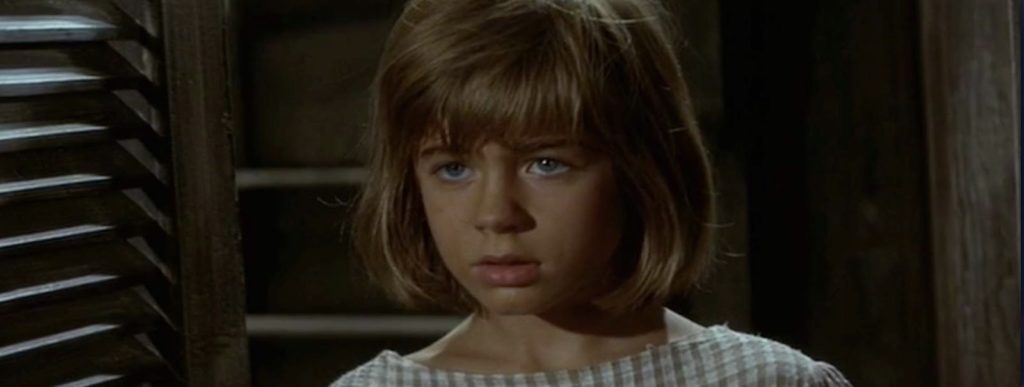One doesn’t expect very much of an adventure drama marketed to children and starring Anthony Quinn that was released in 1965. Though A High Wind In Jamaica is all of these things, it manages to exceed any expectations.

The screenplay, based upon the novel of the same name written by Richard Hughes in 1929, was adapted by Stanley Mann, Ronald Harwood & Denis Cannan, and helmed by noted director Alexander Mackendrick (The Sweet Smell Of Success, The Man In The White Suit). Despite being sold as sea fairing adventure similar to Disney’s Treasure Island,A High Wind In Jamaica manages to be the antithesis of that kind of escapist filmmaking.
Captain Chavez (Anthony Quinn) and his first mate Zac (James Coburn) lead their ship full of rowdy pirates, plundering a vessel bound for England. Unknown to them, a handful of children passengers on their way to boarding school have stowed away on their ship. Uncharacteristically, Chavez permits the children to stay on board, becoming a surrogate father to the children, especially Emily (Deborah Baxter). Despite the civility demonstrated by Chavez, the children run amok on his ship. They break nautical taboos and superstitions, keeping the crew on edge. Things worsen when a child dies while visiting a harbor city with Chavez and Zac.
All of these events, of which the children are responsible, cause the crew to mutiny when Chavez decides not to plunder a passing ship, but deposit the children there safely instead. Being suspected of murdering the dead child (played by author Martin Amis when he was a boy), it isn’t long before the British Navy is boarding Chavez’s ship. Tragically, the British Navy intercepts Chavez just as his crew are taking prisoners from the before mentioned passing ship. One of the prisoners so startles Emily that she stabs the man to death. Later, in England, Emily testifies it was Chavez who killed the prisoner, therefore sentencing Chavez and his crew to death.
A recurring motif in the work of Mackendrick is the depiction of innocence as cruelty, and I would argue that has never been clearer than in A High Wind In Jamaica. None of the archetypes fit consistently. Peripheral characters may fit into certain set standards, but the principle cast is playing their parts in reverse. The children torment the pirates, the pirates nurture the children. The children are devoid of any compassion at all. When the boy dies while on shore in the harbor city, the primary concern of his siblings is who shall get his blanket. Likewise, in the film’s opening scene a Jamaican man is killed in a violent storm, a manservant of their father’s. Rather than demonstrate grief, fear or misunderstanding in the customary fashion, the children sing and dance about reciting a macabre nursery rhyme. The pirates never act without compassion, preferring to bluff their way out of problems rather than resort to violence.
The primary reason that Mackendrick can execute his dark moral analysis is due to the performance Anthony Quinn gives as Chavez. Relying primarily on facial expressions, Quinn makes the subtexts of pity, compassion, and mercy in his character evident to the audience. Always understated, Quinn is able to ground the more fanciful archetypes of pirate dramas that populate the background of the film. Other turns are executed with the same restraint and nuance as Quinn’s, primarily by Dennis Price (A Canterbury Tale, Vampyros Lesbos) in his role as a prosecuting attorney at the end of the film.
Mackendrick’s film demonstrates, along with Sweet Smell Of Success, his versatility and thematic preoccupations as a director. Dodging cliché and repetitiveness, A High Wind In Jamaica is a surprising little gem from the end of Hollywood’s studio era and demands reassessment today.
